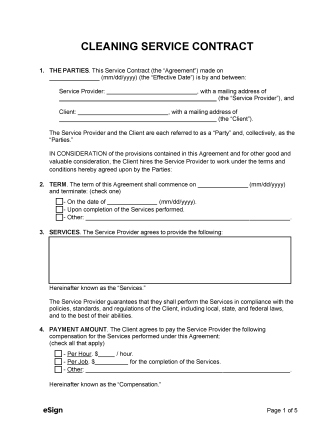

A cleaning service contract is a legal document between a client that agrees to hire a cleaner to wash, vacuum, mop, dust, and related labor. It can be used for commercial or residential property on a recurring basis or for a one-time job.
A cleaning service contract is used when a company or individual wishes to engage the services of a professional cleaner.
Business entities often hire contractors to clean company property instead of employing a janitorial staff because they can claim it as an expense, and because they don’t need to manage the contractor’s work. Furthermore, independent contractors aren’t entitled to employee benefits.
Private customers hire cleaning services to gain more free time outside of their normal schedule while ensuring that their home is kept clean and tidy.
The following information is generally required to complete a cleaning service contract:
The names and mailing addresses of the professional cleaner and the client need to be provided in the contract. The mailing addresses will be important if invoices or legal notices need to be sent from one party to another.
The agreement will need to indicate the contract’s start and end date. The start date cannot be backdated prior to the contract signing.
The scope of work, which includes the work schedule, areas that require cleaning, types of cleaning products, occasional tasks, and any restrictions on services, must be clearly stated to ensure client satisfaction.
To ensure that the cleaner is paid in a timely manner, the contract should spell out the amount of compensation, whether they charge an hourly rate or flat fee, and when payments will occur.
For the client to avoid certain liabilities, the contract must state that the cleaner is not an employee of the client, and as an independent contractor, will be responsible for managing their own work and paying income taxes.
A service contract must be signed by both parties to ensure its enforceability. The document should be thoroughly reviewed before it is executed. Once it has been signed, it becomes legally binding.
Most contract cleaning services work for their clients on a regular basis, either daily, weekly, or monthly. Clients may require some tasks to be completed less often than others. Some of the common services that professional cleaners may specialize in include the following:
Carefully negotiating an agreement and providing specific information in the document helps to avoid confusion and disputes between a cleaner and their clients.
By having all their clients sign contracts, professional cleaners will be able to plan out a regular work schedule, create monthly budgets, and project their annual profits. Most importantly, they can use the legal contract to demand payment if a client underpays or doesn’t pay on time.
Although it may be cheaper to pay a cleaner under the table or engage in handshake agreements, signing a cleaning service contract provides the client assurances that the contractor will hold up their end of the bargain. The cleaner will be obligated to stick to the schedule set out in the agreement, and deliver services as specified. In the event that the contractor breaks contract, the client can seek legal options for recompense.